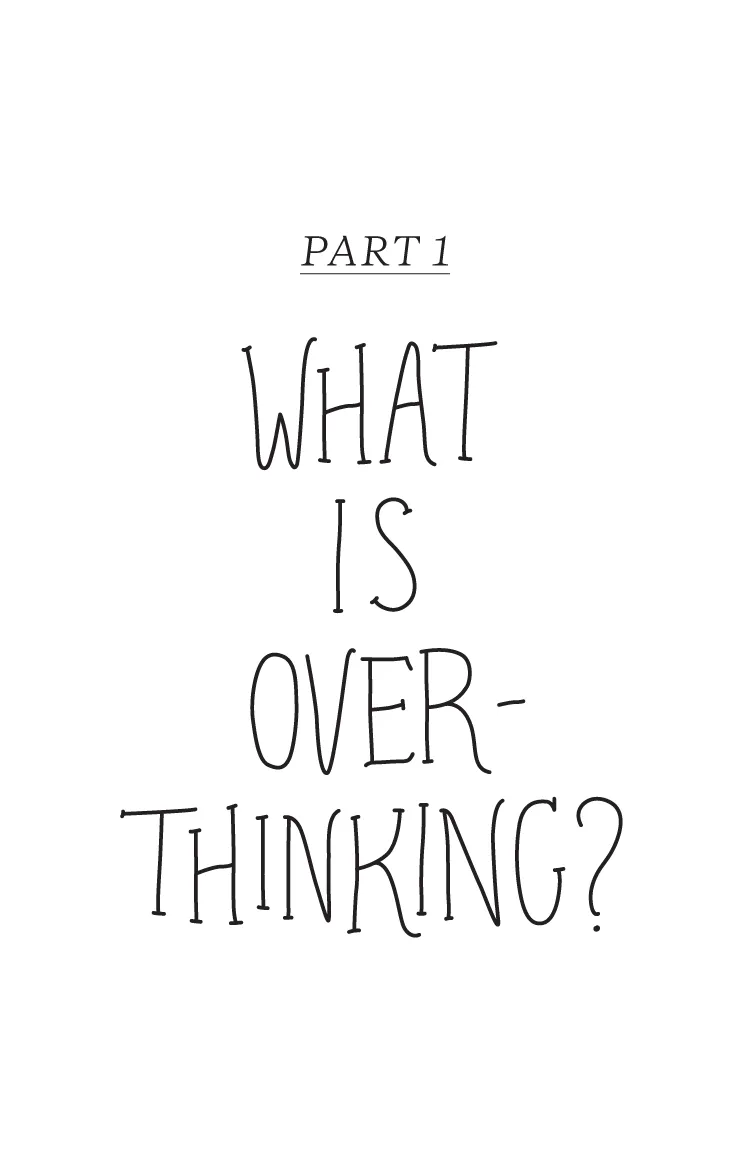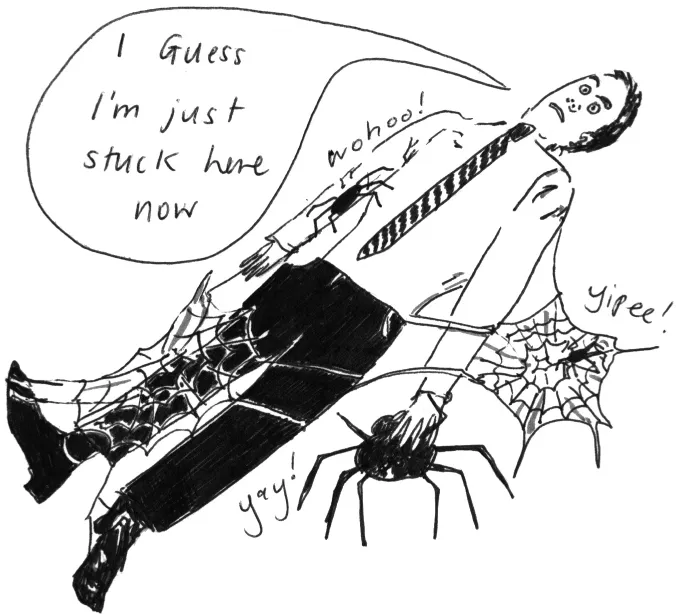
eBook - ePub
The Book of Overthinking
How to Stop the Cycle of Worry
Gwendoline Smith
This is a test
Buch teilen
- English
- ePUB (handyfreundlich)
- Über iOS und Android verfügbar
eBook - ePub
The Book of Overthinking
How to Stop the Cycle of Worry
Gwendoline Smith
Angaben zum Buch
Buchvorschau
Inhaltsverzeichnis
Quellenangaben
Über dieses Buch
Overthinking is also known as worrying or ruminating and it's a form of anxiety that many people suffer from.Psychologist and New Zealand bestselling author Gwendoline Smith explains in clear and simple language the concepts of positive and negative overthinking, the truth about worry and how to deal with the 'thought viruses' that are holding you back.She helps you understand what's going on in your head, using humour, lots of examples and anecdotes, and she offers powerful strategies for addressing your issues.Based on cognitive behavioural theory, this book will help you in all the key areas of your life: from your personal life to relationships and work.
Häufig gestellte Fragen
Wie kann ich mein Abo kündigen?
Gehe einfach zum Kontobereich in den Einstellungen und klicke auf „Abo kündigen“ – ganz einfach. Nachdem du gekündigt hast, bleibt deine Mitgliedschaft für den verbleibenden Abozeitraum, den du bereits bezahlt hast, aktiv. Mehr Informationen hier.
(Wie) Kann ich Bücher herunterladen?
Derzeit stehen all unsere auf Mobilgeräte reagierenden ePub-Bücher zum Download über die App zur Verfügung. Die meisten unserer PDFs stehen ebenfalls zum Download bereit; wir arbeiten daran, auch die übrigen PDFs zum Download anzubieten, bei denen dies aktuell noch nicht möglich ist. Weitere Informationen hier.
Welcher Unterschied besteht bei den Preisen zwischen den Aboplänen?
Mit beiden Aboplänen erhältst du vollen Zugang zur Bibliothek und allen Funktionen von Perlego. Die einzigen Unterschiede bestehen im Preis und dem Abozeitraum: Mit dem Jahresabo sparst du auf 12 Monate gerechnet im Vergleich zum Monatsabo rund 30 %.
Was ist Perlego?
Wir sind ein Online-Abodienst für Lehrbücher, bei dem du für weniger als den Preis eines einzelnen Buches pro Monat Zugang zu einer ganzen Online-Bibliothek erhältst. Mit über 1 Million Büchern zu über 1.000 verschiedenen Themen haben wir bestimmt alles, was du brauchst! Weitere Informationen hier.
Unterstützt Perlego Text-zu-Sprache?
Achte auf das Symbol zum Vorlesen in deinem nächsten Buch, um zu sehen, ob du es dir auch anhören kannst. Bei diesem Tool wird dir Text laut vorgelesen, wobei der Text beim Vorlesen auch grafisch hervorgehoben wird. Du kannst das Vorlesen jederzeit anhalten, beschleunigen und verlangsamen. Weitere Informationen hier.
Ist The Book of Overthinking als Online-PDF/ePub verfügbar?
Ja, du hast Zugang zu The Book of Overthinking von Gwendoline Smith im PDF- und/oder ePub-Format sowie zu anderen beliebten Büchern aus Crescita personale & Miglioramento personale. Aus unserem Katalog stehen dir über 1 Million Bücher zur Verfügung.
Information

CHAPTER ONE
OVERTHINKING: A DEFINITION
overthink (verb) to think too much about (something): to put too much time into thinking about or analysing (something) in a way that is more harmful than helpful. (Merriam-Webster online dictionary)
Out of the many definitions I found of overthinking, I warmed to this one the most, because it describes the act in very simple terms. It also highlights the potential to be harmful that overthinking has.
Everyone overthinks things once in a while. However, there are those individuals—perhaps you are one of them—who find it quite impossible to shut down the constant onslaught of unwanted thoughts. There are two distinct forms of this type of inner monologue:
1. Ruminating, which involves rehashing the past.
• I shouldn’t have made that comment in the meeting last week.
• I shouldn’t have left my last job. If I had stayed, I would be much happier than I am now.
• I shouldn’t have eaten that piece of cake at the party yesterday. Now I am going to be fat forever.
These thought patterns are closely associated with regret and guilt.
2. Worrying, which is when you consistently make negative, catastrophic predictions about the future.
• When I hand in my report to the boss, she will think it is hopeless and then I will be handed my notice. Then I won’t be able to pay my mortgage, I’ll lose the house and won’t be able to provide for my family.
• And so on, and so forth.

Worrying about potential future disasters creates fear and anxiety.
Being plagued by either or both of these types of overthinking can leave you in a state of constant anguish.
On a lighter note, it is our ability to think that makes us human. It is natural to get absorbed by what we are doing and think about those things. However, if overthinking leads you into a downward spiral of negative, destructive thoughts then, ‘Houston, we have a problem.’
Once this process occurs, you begin to create problems that aren’t there. Subsequently, you begin to believe and feel that those problems are real and valid. As a result of these beliefs, you then begin to worry and feel anxious. The thoughts then become paralysing, and impede your ability to problem-solve.
The other definition of overthinking which I like comes from the online Urban Dictionary:
overthinking a great way to f@ck everything up. #complicated #bullshit #hard #f@ck #hate it
Not too far off the mark, I say!
All jokes aside, however, I believe that the more knowledge you have about what you are experiencing, the closer you are to managing those unwanted thoughts and experiences.
SHOULD I BE CONCERNED
ABOUT MY OVERTHINKING?
People often ask me if all overthinking is harmful. In my opinion, no. Sometimes we can become engrossed in thought, and be stimulated by that experience—like we have been hypnotised, losing track of time in an almost trance-like state. I guess we could liken this to daydreaming or mind-wandering.
Here are a few examples:
You have just fallen in love, and you find yourself thinking about that person all day. You may even dream about them at night. (I guess that’s day- and night-dreaming.)
Is that problematic? No. Most people love that experience and find it enjoyable and exciting, not anxiety-provoking.
Your wedding is coming up. You want your hair and dress to be just right, so you think about options and colours all day.
Is that a problem? It can’t be that bad—a lot of people appear to keep getting married, and surviving it!
You’re training for a swimming competition, and you think about your strokes and your breathing constantly.
Problem? Sounds more like a desire to succeed. Athletes live in this psychological domain throughout their careers. It is only when this thought pattern is driven by a fear of failure (and turns into worry) that sports psychologists intervene.
You find yourself constantly thinking about your golf swing or the new recipe you are going to try when your friends come for dinner. Thinking and planning, thinking and planning.
Problem or excitement? I suggest the latter.
The answer lies in how you are thinking. If your thinking goes like this:
OMG I’ve chosen the wrong colours for the bridesmaids. I’m going to look fat in my dress. I should have got the A-line vintage dress and not the chiffon meringue. People are going to think ‘Why is he marrying that fat cow with no dress sense?’
These are the types of thoughts that will create fear and produce toxic over-stimulation.
But if the thinking goes like this:
I am so looking forward to my wedding day. My girls are going to look gorgeous, and so will my hubby-to-be. I love my dress, I love the invites, the venue is perfect . . .
This kind of thinking is pleasurably stimulating, even though you may think about the same topic throughout the day and into the night. Over-thinking, yes—but a problem? I don’t think so.

One of the things about overthinking that clinicians get concerned about is if it is disturbing your sleep. If you spend all night thinking about your bridesmaids’ dresses, does that make it a problem? Not necessarily. You will probably be exhausted the following night and drift off to sleep with ease, so you have not established a pattern of poor sleep. But fear-based overthinking can create chemicals in the brain that are unhelpful to the system, and result in disturbed sleep.
What I will refer to as positive overthinking activates chemicals in the brain such as dopamine, oxytocin, serotonin and endorphins—all associated with happiness. This means we desire them and, in the extreme, will repeat behaviours that assure access to them. Humans seek endorphin stimulation via exercise, watching comedy, listening to music, engaging in creative pursuits and so on.
However, when the pursuit of pleasure involves behaviours that provide a means to avoid life’s daily problems—e.g. gambling, watching screens, using gaming machines and drinking alcohol—it is not so harmless. (At a conference on compulsive gambling I went to many years ago, the keynote speaker said that the difference between a recreational gambler and a compulsive gambler is that the addict is looking to solve problems through their gambling. This is in contrast to the recreational punter, who is looking for a flutter, a bit of excitement and a night out.)
As you can see from the examples above, not all overthinking is positive. Now let’s take a look at negative overthinking. Studies show that getting stuck in your head, focusing on negative events (and therefore experiencing feelings of regret, self-blame), can be the biggest predictor of some of todays’ most common mental-health problems, such as anxiety and depression. These studies— of which there are millions—introduce us to and educate us on the detrimental health impacts of negative overthinking.
So, the question ‘Should I be concerned about my overthinking?’ has a simple answer:
‘Yes, if it is thinking that gets in the way of your ability to function.’
—DR ROBERT SHIEFF, PSYCHIATRIST AND COGN...
—DR ROBERT SHIEFF, PSYCHIATRIST AND COGN...